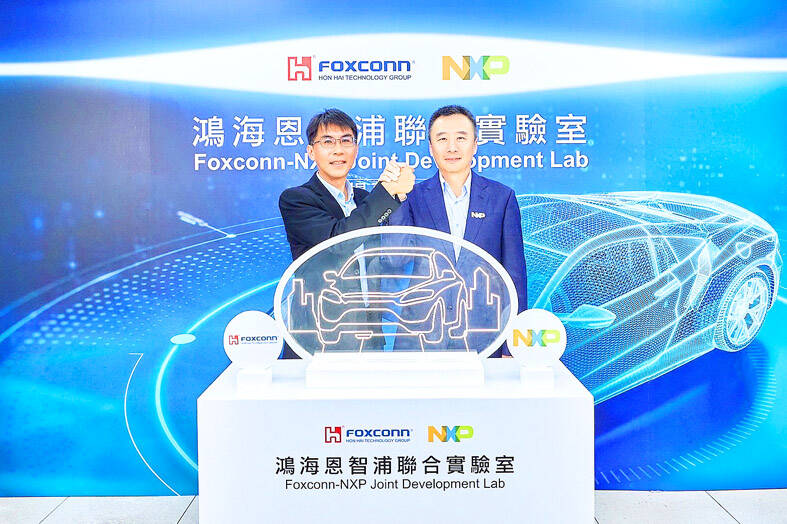NXP Semiconductors and Hon Hai Technology Group (鴻海科技集團), known internationally as Foxconn (富士康), yesterday jointly launched a laboratory in Taoyuan County’s Nankan District (南崁), deepening their strategic collaboration in bringing software-defined electric vehicles (SDEV) to the market faster.
The lab aims to accelerate Hon Hai’s efforts in software-defined electric vehicles, leveraging NXP’s comprehensive electrification portfolio and cross-vehicle system solutions using the S32G and S32K3 families for domain and zonal controllers targeting service-oriented gateways, vehicle networking and safe vehicle control, NXP said in a statement.
The collaborative lab brings together more than 200 engineers based locally and abroad from Hon Hai and NXP, the statement said.

Photo courtesy of NXP Semiconductors
The lab is to be the primary location for innovation, discussion, training and enabling new applications, it said. The equipment for the first-phase operation has been moved in the lab, it said.
“The lab will accelerate the progress of electric, software-defined vehicles from talk to reality. The auto industry has to become faster and more efficient, and NXP is pleased to extend its system solutions portfolio to enable electrification, next-generation architectures, smart and secure car access systems, and more,” NXP Semiconductors Taiwan senior sales director Elton Tsang (臧益群) said in the statement.
Demonstrating their partnerships in automotive electrification, Foxtron Vehicle Technologies Co (鴻華先進), an EV designing and manufacturing arm of Hon Hai, showcased its latest EV, the Model B, during NXP’s annual technology forum in Taipei on Tuesday, ahead of the vehicle’s commercialization next year. The Model B is equipped with NXP’s S32G and S32K3 solutions.
“We work together to create scalable platforms to enable faster time to market, to improve [production] cost in a very innovative way and to bring new cars into this rapidly growing area,” NXP global sales executive vice president Ron Martino told reporters on Wednesday.
Optimized and innovative semiconductor content would help EV original-electronic manufacturers to achieve reductions in total system costs, including software costs, he said.
The latest partnerships was an extension from a memorandum of understanding NXP signed with Hon Hai in July last year to jointly develop platforms for a new generation of smart, connected vehicles, aiming to leverage NXP’s portfolio of automotive technologies.
As the semiconductor content in each car is outgrowing the unit shipments of vehicles, NXP expects the automotive segment to be the fastest growth engine for the company next year, followed by the industrial and Internet-of-Things segment, Martino said.
The company projected that automotive segment revenue would expand at an annual growth rate of between 9 percent and 14 percent during the 2021-2024 period.
The average semiconductor content per car is expected to grow at an annual rate of 8 percent to US$1405 by 2029, up from US$909 today, Martino said, citing a Bloomberg forecast.

Intel Corp chief executive officer Lip-Bu Tan (陳立武) is expected to meet with Taiwanese suppliers next month in conjunction with the opening of the Computex Taipei trade show, supply chain sources said on Monday. The visit, the first for Tan to Taiwan since assuming his new post last month, would be aimed at enhancing Intel’s ties with suppliers in Taiwan as he attempts to help turn around the struggling US chipmaker, the sources said. Tan is to hold a banquet to celebrate Intel’s 40-year presence in Taiwan before Computex opens on May 20 and invite dozens of Taiwanese suppliers to exchange views

Application-specific integrated circuit designer Faraday Technology Corp (智原) yesterday said that although revenue this quarter would decline 30 percent from last quarter, it retained its full-year forecast of revenue growth of 100 percent. The company attributed the quarterly drop to a slowdown in customers’ production of chips using Faraday’s advanced packaging technology. The company is still confident about its revenue growth this year, given its strong “design-win” — or the projects it won to help customers design their chips, Faraday president Steve Wang (王國雍) told an online earnings conference. “The design-win this year is better than we expected. We believe we will win

Chizuko Kimura has become the first female sushi chef in the world to win a Michelin star, fulfilling a promise she made to her dying husband to continue his legacy. The 54-year-old Japanese chef regained the Michelin star her late husband, Shunei Kimura, won three years ago for their Sushi Shunei restaurant in Paris. For Shunei Kimura, the star was a dream come true. However, the joy was short-lived. He died from cancer just three months later in June 2022. He was 65. The following year, the restaurant in the heart of Montmartre lost its star rating. Chizuko Kimura insisted that the new star is still down

While China’s leaders use their economic and political might to fight US President Donald Trump’s trade war “to the end,” its army of social media soldiers are embarking on a more humorous campaign online. Trump’s tariff blitz has seen Washington and Beijing impose eye-watering duties on imports from the other, fanning a standoff between the economic superpowers that has sparked global recession fears and sent markets into a tailspin. Trump says his policy is a response to years of being “ripped off” by other countries and aims to bring manufacturing to the US, forcing companies to employ US workers. However, China’s online warriors